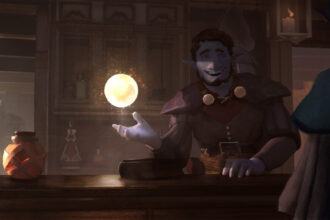The Difficulty of using Evil in your Game
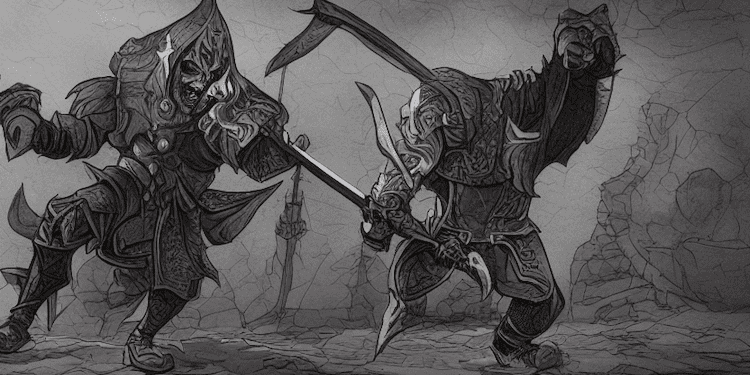
As a game master/referee/dungeon master/storyteller, we are creating a story together with the players that is fun. Then we have to create something that will go against the player’s goals. Utilizing different antagonists to usurp their goals can be a hard concept for all of us lawful good people. We take the “evil” monsters and have them attack and try to kill the players. Hopefully, the players vanquish the monsters, get their treasure & experience, and go back to town.
That is the basic concept, and so then “evil” is easily spotted and dispatched. Typically anything more complex or subtle is hard to get right. But that is the goal. I think this is because we like to think of the fantasy world as a Utopia and very different than our own world. Monsters are killed and the town is saved, Hurray! Then there is our world where evil isn’t so apparent or easily spotted, our world where each side has a reason to do evil. Each opposing side thinks they are doing things for the right reasons. But then if we want to get the players engaged, we need to start thinking about evil and make the encounters more interesting than just hack & slash. So let’s start looking at Evil.
What is Evil?
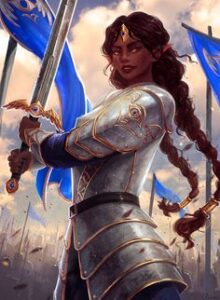 So we have D&D Evil being the polar opposite of the Player Characters, and this is at the heart of what we think that the Dungeon Master must portray to them. He must describe the actions of Monsters, NPCs, and Beast, and a lot of the time they are evil. So how does he go about doing this? First, we need to keep in mind that the Player Characters sometimes portray evil when they do things not for the greater good, but rather for their own self-interests. So a lot of their actions are Evil. The players may be inherently good, but at times they are making evil actions. The DM should remind them or even stop playing to discuss if things are getting out of hand. Because after all, the Players are Heroes. A simple, “your character probably wouldn’t do that” can help them make non-evil decisions. But wait a minute; D&D is all about self-interests, Gold-Magic Loot-Experience Points.
So we have D&D Evil being the polar opposite of the Player Characters, and this is at the heart of what we think that the Dungeon Master must portray to them. He must describe the actions of Monsters, NPCs, and Beast, and a lot of the time they are evil. So how does he go about doing this? First, we need to keep in mind that the Player Characters sometimes portray evil when they do things not for the greater good, but rather for their own self-interests. So a lot of their actions are Evil. The players may be inherently good, but at times they are making evil actions. The DM should remind them or even stop playing to discuss if things are getting out of hand. Because after all, the Players are Heroes. A simple, “your character probably wouldn’t do that” can help them make non-evil decisions. But wait a minute; D&D is all about self-interests, Gold-Magic Loot-Experience Points.
So maybe we exclude those self-interest points of the Players and instead focus on what is evil for the game world. To do that I usually ask myself what did Gary Gygax say about evil? And here it is:
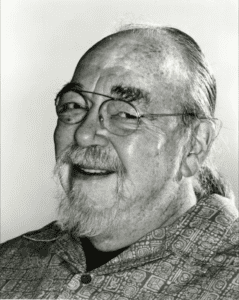 Good and Evil: Basically stated, the tenets of good are human rights, or in the case of AD&D, creature rights. Each creature is entitled to life, relative freedom, and the prospect of happiness. Cruelty and suffering are undesirable. Evil, on the other hand, does not concern itself with rights or happiness; the purpose is the determinant. ~Gary Gygax, AD&D Dungeon Masters Guide (1979)
Good and Evil: Basically stated, the tenets of good are human rights, or in the case of AD&D, creature rights. Each creature is entitled to life, relative freedom, and the prospect of happiness. Cruelty and suffering are undesirable. Evil, on the other hand, does not concern itself with rights or happiness; the purpose is the determinant. ~Gary Gygax, AD&D Dungeon Masters Guide (1979)
So we have Life, Liberty, and the Pursuit of Happiness for Good, and Evil is the embodiment of self-interests and does not concern itself with those ideals of Good. But what does that mean? Here are some ideas for portraying Evil ideas:
- Is consistently self-deceiving, with the intent of avoiding guilt and maintaining a self-image of perfection
- Deceives others as a consequence of their own self-deception
- Psychologically projects his or her evils and sins onto very specific targets, scapegoating those targets while treating everyone else normally (“their insensitivity toward him was selective”)
- Commonly hates with the pretense of love, for the purposes of self-deception as much as the deception of others
- Abuses political or emotional power (“the imposition of one’s will upon others by overt or covert coercion”)
- Maintains a high level of respectability and lies incessantly in order to do so
- Is consistent in his or her sins. Evil people are defined not so much by the magnitude of their sins, but by their consistency (of destructiveness)
- Is unable to think from the viewpoint of their victim
- Has a covert intolerance to criticism and other forms of narcissistic injury
Tolkien on Evil
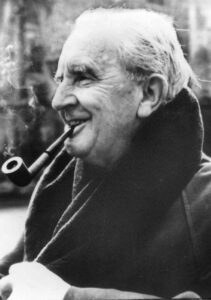 I like Tolkien. All right, I love Tolkien! And he had some good examples of good vs. evil, and characters that embodied evil. The one great example of evil I remember the most in Lord of the Rings was the antagonist, Gollum. He was evil….but only acted evil sometimes. He did a lot of really bad stuff, betrayal, lying, stealing, killing, and deception, but a lot of his motivation was on getting the ring back. He just wanted to go back to his cave and eat fish and the occasional goblin. He had a few occasions to kill Frodo, and take the ring… but what about Frodo. Frodo had tons of reasons and opportunities to kill Gollum. but why didn’t he kill him? Frodo was inherently good and had sympathy even for Gollum. A lot of people might see that as weakness, but that’s just the evil talking. Evil would be when Gollum set up Frodo and betrayed him to be eaten by Shelob the giant spider. Ultimate back-stab!
I like Tolkien. All right, I love Tolkien! And he had some good examples of good vs. evil, and characters that embodied evil. The one great example of evil I remember the most in Lord of the Rings was the antagonist, Gollum. He was evil….but only acted evil sometimes. He did a lot of really bad stuff, betrayal, lying, stealing, killing, and deception, but a lot of his motivation was on getting the ring back. He just wanted to go back to his cave and eat fish and the occasional goblin. He had a few occasions to kill Frodo, and take the ring… but what about Frodo. Frodo had tons of reasons and opportunities to kill Gollum. but why didn’t he kill him? Frodo was inherently good and had sympathy even for Gollum. A lot of people might see that as weakness, but that’s just the evil talking. Evil would be when Gollum set up Frodo and betrayed him to be eaten by Shelob the giant spider. Ultimate back-stab!
Evil Fantasy World
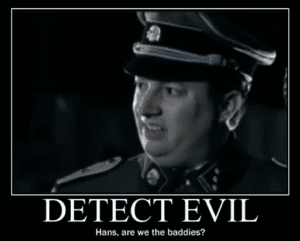 We all live in a sort of evil world. Okay, a lot of evil is out there. And Plato wrote that there are relatively few ways to do Good, but there are countless ways to do Evil, which can therefore have a much greater impact on our lives, and the lives of other beings capable of suffering. So another way to portray Evil in your game is to have the world surrounding the Player Characters as evil. Everything is assumed to be bad and not much good in the world. The player’s characters happen to be the last shining hope in a world full of murder, deceit, slavery, oppression, drugs, poverty, etc. So not only are the monsters the obvious evil in the world, but the entirety of civilization is evil. With so much deception, it will be a hard choice for the players in what they want to do about it. Who can they trust? What can they accomplish? As the DM, you will need to work with the players as you describe such a world to them. Goodly acts won’t be rewarded but instead will be questioned. Stopping a slave owner from beating his slave may be a crime and punishable by law enforcement. Public executions are a daily occurrence. Going out of your way to saving a person from a burning building and risking your own life, why? It will be tricky but has a lot of play and plot potential for your game.
We all live in a sort of evil world. Okay, a lot of evil is out there. And Plato wrote that there are relatively few ways to do Good, but there are countless ways to do Evil, which can therefore have a much greater impact on our lives, and the lives of other beings capable of suffering. So another way to portray Evil in your game is to have the world surrounding the Player Characters as evil. Everything is assumed to be bad and not much good in the world. The player’s characters happen to be the last shining hope in a world full of murder, deceit, slavery, oppression, drugs, poverty, etc. So not only are the monsters the obvious evil in the world, but the entirety of civilization is evil. With so much deception, it will be a hard choice for the players in what they want to do about it. Who can they trust? What can they accomplish? As the DM, you will need to work with the players as you describe such a world to them. Goodly acts won’t be rewarded but instead will be questioned. Stopping a slave owner from beating his slave may be a crime and punishable by law enforcement. Public executions are a daily occurrence. Going out of your way to saving a person from a burning building and risking your own life, why? It will be tricky but has a lot of play and plot potential for your game.
Evil Motivation
 So maybe it is just a country or small kingdom that happens to be Evil. The game master can have an Evil Overlord presented to the players that is too difficult to overcome head-on. So the players will have to undermine them slowly as they gain more power and then the big boss battle happens. I found have found some useful inspiration from popular fiction books and television. So here is a list of more motivations for Evil I found in an article from Darcy Pattison for writers. I hope that this can give the game master more inspiration for their games.
So maybe it is just a country or small kingdom that happens to be Evil. The game master can have an Evil Overlord presented to the players that is too difficult to overcome head-on. So the players will have to undermine them slowly as they gain more power and then the big boss battle happens. I found have found some useful inspiration from popular fiction books and television. So here is a list of more motivations for Evil I found in an article from Darcy Pattison for writers. I hope that this can give the game master more inspiration for their games.
- Romance: I want to marry the princess.
- Revenge – ruin a hero: I want to ruin the King.
- To distinguish oneself: I want the princess to respect me.
- To fit in/gain acceptance: I want to attend the princess’ coronation and eat at her table.
- Justice: The king killed my mother, so the king must die.
- Greed – get rich: I want to steal everything from the King’s treasury.
- Fear: I am afraid that our lands will be stripped bare by this evil king.
- Desperation: If something doesn’t change in the next week, I will be executed.
- Social cohesion: Us zombies need to stick together.
- Desire to better oneself: I was born a peasant, but I will die a king.
- Power to achieve a goal: I must be king, so I can change the laws about owning property.
- Escape destiny: At birth, a prophet said I would kill the king; however, I am stealing enough money to escape to another country and avoid that destiny.
- Achieve destiny: At birth, a prophet said I would kill the king; and that’s my plan.
- Persecution: Growing up in a wheelchair has been hell.
- Rivalry: Prince John wants to marry the Princess, but she’s mine.
- Discovery: I will find out the king’s darkest secret and use it against him.
- Ambition: I want. . . everything!
- Survival (deliverance): In the midst of this civil war, I will survive.
- Self-sacrifice: Someone must stop this evil king and I’ve decided to step up and do it.
- Love: The princess has stolen my heart; so, I’ll steal her.
- Hate: The princess is an evil woman; when she becomes my wife, I’ll make her suffer.
- Conspiracy: I’ve gathered twelve good men to help me overthrow this king.
- Honor: Men from my city never back down, even if it costs me everything.
- Dishonor: Men from my city are idiots; I’ll never do things the “right” way.
- Unnatural affection: I want to marry the princess and take the queen as a lover.
- Catastrophe: A volcano is going to erupt and when it does, I’ll plunder the city.
- Grief and loss: When my mother died, I lost all interest in doing good.
- Rebellion: I’m the leader of the guerrilla forces.
- Betrayal: I was engaged to the princess, and then she married Prince John.
- Spread hate and fear: I love hate. Hate, hate, hate.
- Corrupt everyone: Come join me as I rob the king.
- Control the kids: If those kids make noise one more time at midnight, I’ll get ’em.
- Leave me in peace: I never wanted to leave my hometown, but since you’ve made me, I’ll show you what’s what.
- Recover what is lost: The king took my mother’s locket as tribute, and if it’s the last thing I ever do, I’ll get it back.
- Save humanity: To save humanity, I’ll have to kill the whole army.
- serve a master (ex. The Fuhrer): I’ll follow King George anywhere, even if it means killing King Phillip.
- Destroy: Ha! Ha! Ha! I love to burn down houses.
- Rule part of the world: I want to be King of the Mermaids.
- Rule all of the world: I will rule the Earth.
“Mirror, mirror on the wall . . .” — Forgotten Realms
 And lastly, here is an old adventure source from 2007 WotC’s DnD Steal this Hook by Robert Wiese that shows Evil that I find very similar to the Punisher comic book:
And lastly, here is an old adventure source from 2007 WotC’s DnD Steal this Hook by Robert Wiese that shows Evil that I find very similar to the Punisher comic book:
Westgate, home of the Night Masks, is a city known for thieves and scoundrels. The Night Masks used to hold uncontested sway over the city’s illegal activities, but with the death of the Faceless, smaller guilds have cropped up from time to time. These guilds are pursued relentlessly by local heroes and law enforcement because they are easier to remove than the Night Masks (which survive under different leadership).
|
Campaign Adaptation Eberron: Sharn is an obvious choice for this adventure. Perhaps too obvious. Fairhaven in Aundair is a good alternate choice. You could even set it in Stormreach (on Xen’drik). Generic: A city with some thieves’ guilds is what you need. Easy, huh? Greyhawk: Set this in Greyhawk City itself. Other cities will work just fine, but the Free City has a lot of different thief elements you can work in to complicate matters (including racial issues with Rhenee thieves). |
Then reports filter through the taverns that the heroic paladin Zalah Mystof, who was known for tracking and arresting thieves, has begun killing them off instead. They are just rumors, but the killings become more frequent and witnesses say they saw Zalah in the area or even witnessed him slaughtering thieves that had surrendered.
Needless to say, the smaller guilds that are the target of Zalah’s zeal are very nervous, and they look for mercenaries to kill the paladin as quickly as possible. The PCs could be hired by several different guilds and collect money for the same job from all these patrons — if they can find and kill the paladin.
d100 Motivations
00-00 No tricky motivations here; everyone wants the paladin Zalah dead as soon as possible.
d100 Complications
00-50 The Zalah that is killing the thieves is an evil duplicate of the real Zalah, who was slain by the duplicate. Zalah ran into a mirror of opposition trap when pursuing a group of thieves, and the mirror’s duplicate slew him. Then it began slaying thieves, because it is still Zalah (just evil).
51-60 Zalah is under the mental control of the new leader of the Night Masks, and he is being used to clear out the smaller gangs permanently. Should the PCs break the mental control, they can get Zalah to lead them back to at least some members of the Night Masks.
61-85 The evil Zalah has created himself a lair in the sewers under Westgate (all cities in the Realms with great thieves’ guilds have sewers). He has not placed any guardian creatures himself, but some nasty water-dwelling monsters have moved in.
86-00 Zalah is not evil at all; he slew the evil duplicate because it was deadlier than himself. He gave up arresting thieves because it did no good. Now he is adamant about killing thieves.
![]()
LINKS
Peter’s Evil Overlord List [http://www.eviloverlord.com/lists/overlord.html]
Evil [http://en.wikipedia.org/wiki/Evil]
Platonic Concept of Evil [http://plato.stanford.edu/entries/concept-evil/]
This is a modified post of mine from Tribality 2014


